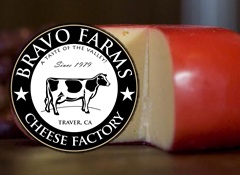
An outbreak of E. coli O157:H7 first became public in Nov. 2010, and would eventually sicken at least 38 people in several U.S. states. Investigators believe the source was Dutch Style Gouda Cheese produced by Bravo Farms of Traver, California from raw milk and sold primarily at Costco and Whole Foods Market stores.
(1).jpg) The artisan cheese maker temporarily shut down.
The artisan cheese maker temporarily shut down.
Bravo was forced to quarantined stockpiles of cheese, and — no real surprise – of the 24 unpasteurized cheese samples investigators took, 15 tested positive for listeria and one tested positive for E. coli O157:H7.
According to the L.A. Times today, state and federal investigators found at least 50 live flies flitting around a processing area at Bravo. They also reported that a rabbit hopped out of a storage room, and a dairy worker scratched his chin then handled milled cheese with his bare hands.
On Thursday, U.S. marshals and Food and Drug Administration agents arrived at the cheesemaker and seized the Gouda, along with piles of Edam and blocks of white cheddar. All told, investigators have locked up more than 80,000 pounds of cheese. Prosecutors say it is all headed for the garbage disposal.
Worried that the cheese would somehow reach the public, and acting to shift the case from state to federal jurisdiction, the Justice Department used a civil legal mechanism to arrest a product — food — and essentially impound it.
Prosecutors filed a civil complaint in federal court in Sacramento last week that lists the cheese — not the farmers who made it — as defendants.
John Sheehan, director of the FDA’s dairy division, said the inspections came from concerns "about raw-milk cheese made under artisanal conditions" and a flurry of nine artisan cheese recalls last year. As of October, the FDA had inspected 102 facilities, some big, some small. Of the 147 samples taken, 32 tested positive for listeria. The inspections continue.
Bravo, which is cooperating with federal officials, has been cleared to make cheese again. It’s using pasteurized milk.

.jpg) • no more ground beef;
• no more ground beef; aged for at least 60 days. The idea is acid and salt help destroy dangerous bugs.
aged for at least 60 days. The idea is acid and salt help destroy dangerous bugs.